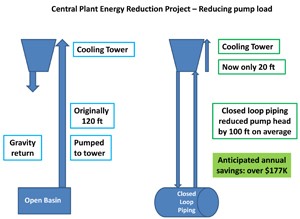
Thanks to Energy-Saving Efforts, UC Earns Most Duke Energy Rebates
In ongoing efforts to realize both economic and energy savings, the University of Cincinnati has earned $2.5 million in conservation-related rebates from Duke Energy. Thats the largest rebate amount provided by the company in its Midwest territory of Ohio, Kentucky and Indiana.
UCs participation in Dukes SmartSaver Incentive Program from June 2012 to December 2014 earned the rebates and
saved a total of 35 million kiloWatt hours of electricity in that time.
According to Joe Harrell, UC director of utilities,
Thats enough energy to power about 3,500 average U.S. homes for a year.
UCs recent energy rebates via the SmartSaver Incentive Program came through a variety of efforts including
-
Use of a closed-loop chilled water system: Water (60,000 gallons per minute) from a closed tank in UCs power plant is vertically pumped using natural pressure vs. electricity 120 feet into a cooling tower. Explained Harrell, Now, air pressure is doing most of the work that electric pumps once had to do. So, now, the pumps only need to use power to move the water the last 20 feet of the chilling process. Air pressure actually moves the water for the first 100 feet.
- Improved, more energy-efficient lighting: The university has replaced thousands of building and garage light fixtures. The new lights are long lasting, expected to last for 25 years, and provide better illumination while requiring about half the energy of those they replaced.
- A four-million-gallon thermal-energy storage tank, measuring about 160 feet long and placed about 30 feet below the Sheakley Athletic Complex. The water in the tank is chilled via electricity at night, when cooling requires less energy and when unit costs for electricity are less expensive. The water is then used during the summer heat to cool campus buildings by day.
- Smart vending machines: All 146 vending Pepsi vending machines on UCs West Campus are outfitted with motion sensors, allowing them to power down when no potential users are nearby, for instance when a building is closed for the night. When in powered down mode, the machines lights turn off and any cooling setting may rise, though still within food-safety limits.
- Server efficiencies wherein different units of the university share servers for data needs vs. each having individual servers.
UCs ongoing efforts related to conservation are a continuation of a quarter century of energy-reduction initiatives. During the past 25 years, UC has consistently reduced energy consumption between 1 and 3 percent per year. So, even as the university grew, new buildings came online and enrollment increased, the energy load was minimized, and energy costs remained flat.
This commitment to energy conservation and fiscal responsibility aligns with the universitys commitment to sustainability through the academic master plan and the universitys Creating Our Third Century goals.
Related Stories
Lindner students celebrated for achievements inside and outside...
April 14, 2025
The Carl H Lindner College of Business held its annual student awards on Monday, April 7, honoring the many academic and professional accomplishments of the college’s students.
Fastest-growing careers: What jobs will be in demand?
In this guide, we’ll break down the fastest-growing careers, how UC can help you gain the skills, experience and network you need to thrive in tomorrow’s workforce.
Volcanic ash buried huge herd of Nebraskan rhinos
April 14, 2025
Discovery magazine highlights UC research examining how prehistoric rhinos lived in mega-herds 12 million years ago.
